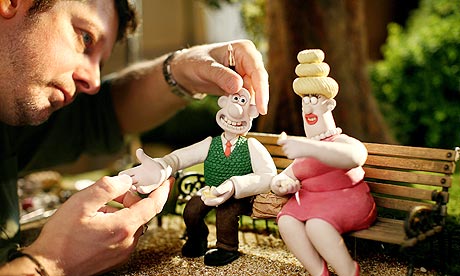
Wallace & Gromit will continue to be made in the UK, George Osborne claimed in his budget speech, as he unveiled a film industry-style tax break to encourage development in the animation and video game sectors.
The chancellor's financial incentive will also apply to high-cost dramas, such as Titanic and Downton Abbey, as revealed last week during the prime minister's trip to the US.
Osborne told the Commons it was the policy of the government to keep Wallace & Gromit exactly where they are – a comment that prompted cheers from coalition benches as it was also a dig at Labour leader Ed Miliband, who is sometimes likened to Wallace, the cheese-loving plasticine hero.
Aardman Animations, the Bristol-based independent producer of Wallace & Gromit, has along with other animators been calling for the Treasury to give a tax relief to support UK production, at an estimated direct cost to the exchequer of £17m a year. Animation is a £300m-a-year industry that employs 4,700 people directly.
Miles Bullough, Aardman's head of broadcast and development, who previously said the firm could be forced to leave the UK to cut costs, said the tax credit would be "transformational" for the industry.
He said: "We have seen a dramatic decline on UK television of home-produced animation and we now have a shot a reversing that trend. The credit will create thousands of UK jobs and our research shows that there will be a long-term financial gain for the UK."
British animation has been in decline in recent years as other countries have offered generous subsidies for cartoonists to move abroad, with Bob the Builder now produced in the US, Thomas the Tank Engine in Canada and Noddy in Ireland. The industry believes the result is British pre-school children now see largely foreign-made content.
Details of the new tax break remain sketchy, with Osborne only announcing an intention to proceed, subject to obtaining state-aid approval from the European commission and a consultation.
But the tax breaks are expected to operate on similar lines to film, in which projects filmed in the UK qualify for a 20% or 25% break depending on the production budget.
The video games industry employs about 9,000 people in the UK, working in 300 studios. But development jobs have been moving to locations such as Montreal in Canada, where tax incentives have helped slash the cost of developing games (which can cost up to £50m).
Games industry trade body UKIE (UK Interactive Entertainment) said that a games tax relief would create an estimated 4,700 direct and indirect jobs, and generate £188m in investment by studios. The Department of Culture, Media and Sport said the break would create and protect 1,650 studio jobs and contribute £280m to GDP.
An estimated £350m a year more would be spent in the UK as a result of the drama tax incentive, according to estimates on behalf of a group of drama producers. They argue that the economy would benefit to the tune of £1bn when taking into account the wider benefits from the greater employment and investment.
Julian Fellowes's £1m an hour ITV1 drama Titanic, which starts on Sunday, was shot in Hungary because it was cheaper to build a replica of the ship in landlocked central Europe than film where the original liner was built, at the Harland and Wolff shipyard in Belfast.
Andy Harries, chief executive of Left Bank Pictures, the producer of Wallander, said the tax relief would give British TV a much-needed shot in the arm.
"British production talent is responsible for some of the best TV in the world and at the moment many productions, which could very easily be shot in the UK, are being made abroad and many talented creatives are moving elsewhere.
"Left Bank Pictures are currently shooting two productions in South Africa – Mad Dogs and Strike Back – where tax breaks make it possible to make hugely ambitious dramas on a British TV budget, and we have many other largescale projects in development that we would love to be able to make in the UK.
"The proposed changes will also welcome productions from around the world to UK shores and, quite apart from the revenue that this will bring, it will also help support the creative community in the UK and help train the next generation of film and TV makers."
Glenn Whitehead of US cable network HBO said: "Today's news on a new tax incentive has turned the UK from one of the most expensive options into a competitive and affordable location."

